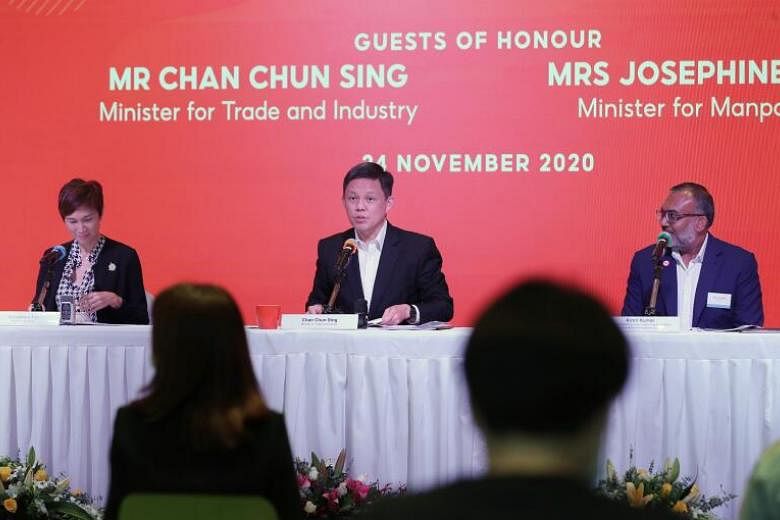Singapore must develop the next generation of home-grown companies that will not only boost the local economy but also compete in the global arena.
An industry that could provide fertile soil for such growth is the infocomm media (ICM) sector, said Trade and Industry Minister Chan Chun Sing yesterday.
He added that this would entail creating and turning more home-grown firms - including small and medium-sized enterprises (SMEs) - into successful global outfits. This would benefit Singaporeans in the form of better job prospects and better wages.
He cited Singapore-based technology firm Sea, which owns e-commerce platform Shopee, as an example of an outfit with a strong international footprint, and how some factors that allow it to succeed are instrumental in how Singapore can propel its economic development.
"In the initial days of our independence, we grew many big companies like DBS and Singapore Airlines," said Mr Chan, who was speaking after a visit to Shopee in Science Park Drive. "Now, it comes time for us to grow another generation of technology companies that can have the world as its market."
Singapore's pro-business environment has created the right conditions for local companies to thrive and for businesses to use it as a base to serve the region, said Mr Chan.
This ecosystem is possible due to factors such as a robust intellectual property protection regime, a skilled workforce, strong rule of law and stable governance.
These are fundamentals that have put Singapore in good stead and "we have every reason to believe that they will continue to serve us well", he said.
Besides the Sea group, home-grown companies such as gaming chair maker Secretlab and cyber security firm V-Key have seen tremendous growth and represent a growing new generation of firms that can offer global markets with new products and solutions.
The presence of vibrant home-grown firms across multiple industries will also help SMEs to grow.
Mr Chan shared that larger firms can work with smaller ones, helping them to reach new markets beyond Singapore.
The Shopee University initiative, for instance, helps sellers and SMEs to adapt their products to the digital platform and grow their online businesses.
The firm also intends to launch an initiative in the first half of next year to help online-ready businesses here expand their cross-border reach into Malaysia - a good starting point for companies looking to take their first steps overseas.
The ICM sector, a key engine of growth in Singapore, contributed about 8 per cent of the country's gross value added and $40.7 billion in nominal value added to the economy last year.
Demand for more advanced tech, such as automation and artificial intelligence, will continue to rise in the short to medium term. Online and digital services, too, are likely to remain strong revenue drivers as more industries shift to digital and cloud-based operations.
Mr Chan stressed that the Republic is well positioned to build on the ICM sector, which plays the role of a growth multiplier for other industries.
He added: "Our aim must be to use the advantages that we have to make sure that we help our companies to grow and bulk up in size, so that they can compete on the international stage to deliver better outcomes for the local SME network, and to deliver a better outcome for our workers."
Calvin Yang


